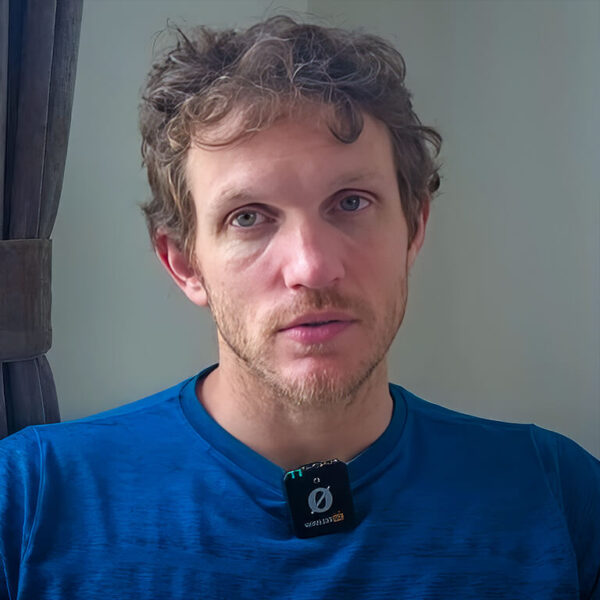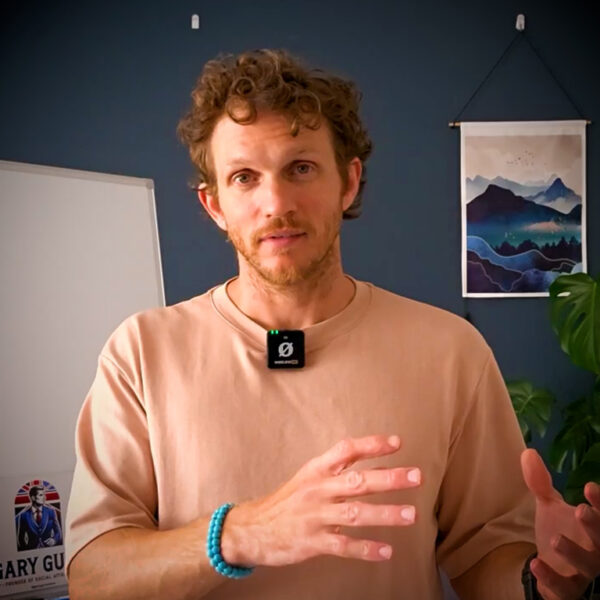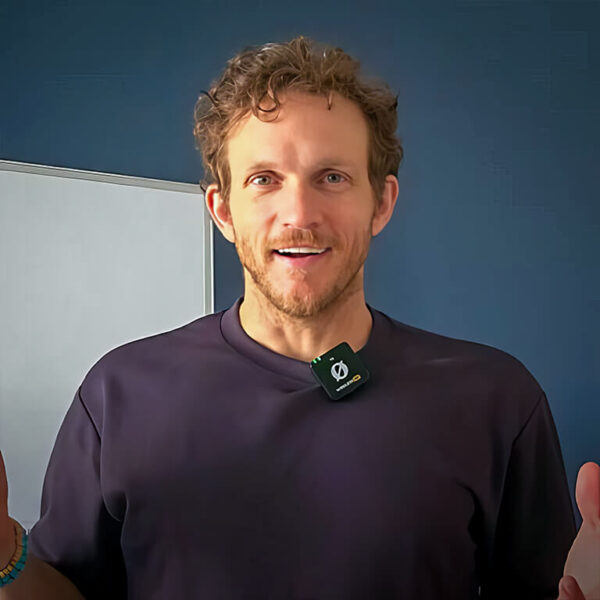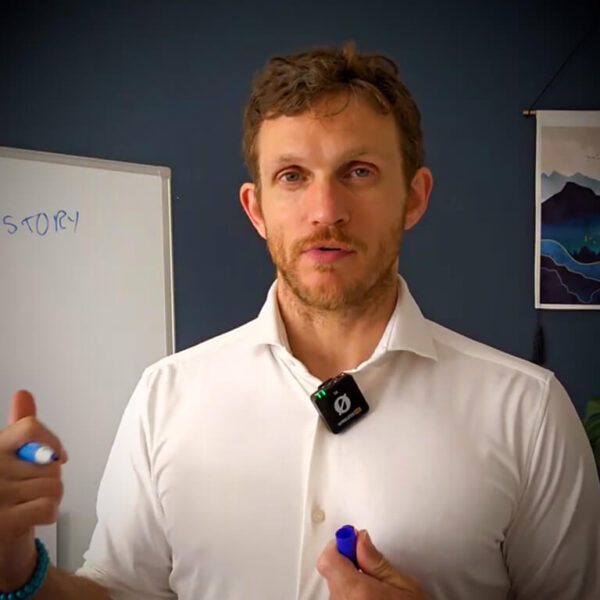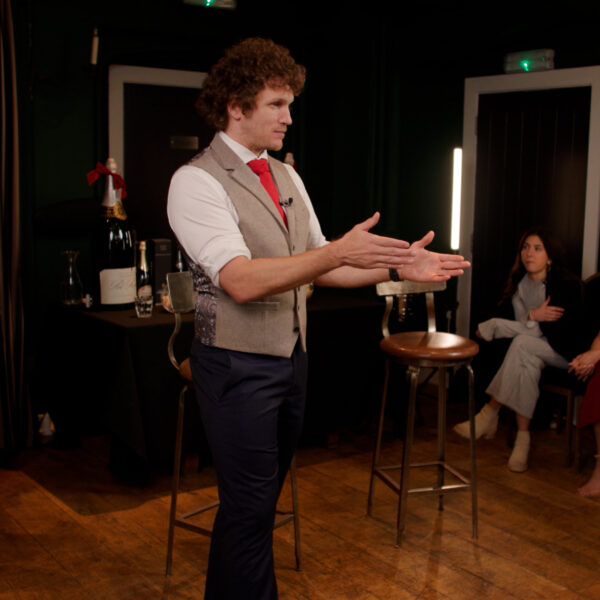
How to Deal With a Bad Day and Regain Your Emotional Balance
Today I am having a bad day. Unlike me, I tried to record this video about ten different times. For the past fifteen years, I have had a rule where I press record and stick to my video no matter what happens. But today it just kept going wrong and my frustration was building and building.
It made me think about how many times in our lives we get stuck on autopilot and all of a sudden things stop working. Then we spend days, weeks, months, or even years trying to figure out why.
Perhaps you have been successful in your dating life up to a certain point, and then all of a sudden you get zero success. So you start taking a look in the mirror. Could it be that you are older? Could it be that you have lost your charm? Could it be that you have put on a bit of weight?
The truth is when you are going through a difficult period or having a bad day, there are a few things that genuinely help.
Bilateral Stimulation for Bad Days
The first thing that I do when I am having a bad day is something called bilateral stimulation. It is very simple. You put on some headphones, search online for bilateral stimulation music, and play it. The music oscillates from your left ear to your right ear and back again.
The reason why I do this is because when you activate both parts of your brain, your left and right hemispheres, it calms your nervous system. Just before I filmed this video, I lay down for around half an hour and practiced bilateral stimulation. While listening, I thought about why I was having a bad day. What is it about what I am trying to do that feels difficult? When was the first time I felt like this?
As I continued, memories began to surface. I felt a huge sense of sadness wash over me, as if I was not good enough. Memories came back from school when I used to be left out. I do not know why these feelings were triggered today, but I do know that bilateral stimulation helps me access the root of these emotions. It calms my nervous system and allows me to get back to my center.
Why Bilateral Stimulation Works
My experience of using bilateral stimulation is that it can be powerful for almost anything. It helps when you feel anxious about something coming up in your life. It helps when you need to deal with past trauma. It helps when you worry too much.
I spent years reading books on worry and trying to apply stoic principles to cope with it. In the end, bilateral stimulation was more effective than anything else I tried. I find it far more powerful than meditation or emotional clearance exercises.
The reason is simple. Bilateral stimulation allows you to think about the issues you are facing while accessing both hemispheres of your brain. This reprograms the memory as non-threatening. You can work out the first time you felt a certain way and process that memory so it no longer controls you. Over time, you begin to feel a little easier every single day.
A Personal Example of Overcoming Triggers
To give more context, yesterday I went shopping and bought some new items of clothing along with a pair of really cool shoes. On the way home, I started to feel uneasy, like I had done something wrong.
So I did bilateral stimulation again. What surfaced was a memory from when I was a child and I got berated for spending money the wrong way. That memory was over thirty-five years old, yet it still influenced my life today.
After processing it, the uneasy feeling was completely gone. I paused and asked myself: how many years has this old memory been affecting me? How many decisions in my life would have played out differently if I had dealt with it sooner?
Combining Bilateral Stimulation and Goal Setting
I would go as far as to say that goal setting is one of the most important things you can do in your life, especially when combined with bilateral stimulation. These two practices together allow you not only to improve your life but also to calm your nervous system and stop repeating the same cycles over and over again.
Toxic Shame and Emotional Stability
Recently I was reading a book on toxic shame and how it affects every single part of life. Toxic shame, anger, disgust, not feeling good enough, fear of rejection—all of these emotions create havoc in your dating life and your overall confidence.
It is small-minded to only focus on goals like wanting to be more confident with women or wanting to date more attractive women. These need to be balanced with emotional stability goals. For example, you might want to feel composed, or reduce the anxiety you feel in specific areas of your life.
In my experience, most people do not want to put time into personal growth. They are happy to read a book or do a guided meditation, but they are not willing to dedicate consistent time to exploring themselves.
The saying “know thyself” is a truism because no matter how much coaching or exploration you have done, there are always parts of your behavior you do not understand. Only through daily practice can you feel calmer and begin to work things out.
Life Is Cyclical and That Is Okay
Life moves in cycles. There are times when everything feels amazing and you feel bulletproof, and you believe it will last forever. Then suddenly, one day, it stops.
What I used to do in those moments was try to force my way back to how things were before. I would push, chase, and fight against reality. I now recognize that this was a mistake.
These days I focus my life on two things: skill acquisition and self-understanding. If I go through a quiet spell with my work, I no longer panic. Sometimes my work is unbelievably chaotic and busy. Other times it slows down. In the past, I would try to force the busy times back by chasing sales, following up with everyone, and pushing too hard.
Now, instead of forcing things, I allow the natural flow to guide me. When I feel great and everything is going well, I go with the current of that river. When things slow down, I turn my focus to learning, acquiring new skills, and understanding myself more deeply.
Why Skill Acquisition Matters on Bad Days
Feeling stuck is one of the hardest things in life. It creates frustration and can make you feel like you are not progressing. That is why skill acquisition is so important.
When you dedicate yourself to learning something new, you create momentum. Even if other areas of your life feel quiet or stagnant, you know that you are still growing.
In my own coaching career, I invested heavily in training when I first began. I joined a six-month mentoring program, practiced public speaking, and committed to learning as much as possible. Since then, most of my growth has come from real-world experience coaching people.
Now that I am in my forties, I feel a new hunger for professional development again. I have booked myself into several different courses to push my growth further. This mindset keeps me moving forward even when external circumstances slow down.
Managing Mental Health Daily
When you are having a bad day, a bad week, or even a bad year, one of the most powerful things you can do is look at your existing habits. Often, people feel anxious and then try to treat that anxiety in the moment. The problem with this approach is that it is reactive.
Instead, you can work on your mental health consistently, in a proactive way. Bilateral stimulation, goal setting, and daily self-reflection are all practices that build resilience. The more consistent you are, the less extreme your highs and lows will feel.
This takes dedication, but over time the effort pays off. You begin to feel more self-confident and grounded, even during difficult times.
Martial Arts and the Flow of Progress
As I sit here writing this, just behind my camera is my martial arts certificate: eighteen months of daily practice in Gundo martial arts, where I earned a grade one with distinction. I spent an hour a day, every day, fully dedicated to training.
Right now, I no longer practice martial arts. Not because I cannot, but because I do not feel called to it at this stage of my life. I could force myself to train every morning, but that would take me away from my center.
Instead, I allow myself to flow with the direction my life is taking. Sometimes that means learning martial arts. Other times it means focusing on emotional well-being, writing, or coaching. The key lesson is not to force what does not feel right but to keep moving forward in ways that serve you now.
Key Lessons on How to Deal With a Bad Day
There are a few important lessons I have learned that might help you the next time you are dealing with a bad day:
-
Do not force things. Pushing against reality often makes things worse.
-
Focus on skill acquisition and understanding yourself more deeply. This creates progress even when life slows down.
-
Practice bilateral stimulation daily. It is one of the most effective ways I have found to calm the nervous system and reframe negative memories.
If you feel overwhelmed when practicing bilateral stimulation, it may be wise to seek out an EMDR therapist who specializes in this work. Professionals can guide you through the process in a safe and structured way.
These practices are not quick fixes. They require dedication, patience, and self-awareness. But over time, they can transform how you deal with a bad day, how you process emotions, and how you navigate the ups and downs of life.
Conclusion: How to Deal With a Bad Day in a Healthy Way
Everyone has bad days. The difference between people who stay stuck and people who grow is how they respond. Learning how to deal with a bad day is less about quick fixes and more about creating habits that calm your nervous system and bring you back to your center.
Bilateral stimulation is one of the most powerful tools I have found. It helps you access the root of emotions, reframe old memories, and create a calmer baseline for your daily life. When you combine this with consistent goal setting, you begin to build a stronger foundation that carries you through both good times and bad.
It is also important to accept that life moves in cycles. There will be times of excitement, growth, and energy, and times of stillness, reflection, or even frustration. The mistake is trying to force one phase to last forever. Instead, let yourself move with the flow of your life while continuing to focus on skill acquisition and personal growth.
For me, martial arts was once a daily discipline. Today, my focus is different. But the principle remains the same: do not fight against yourself, keep learning, and keep moving forward in ways that align with who you are now.
If you are reading this while having a bad day, know that it will pass. More importantly, know that you have tools available to help you process what you are feeling. The more consistently you use them, the easier it becomes to navigate the ups and downs of life with confidence and calmness.
So the next time you are wondering how to deal with a bad day, remember these three steps:
-
Use bilateral stimulation to calm your nervous system and reframe negative emotions.
-
Focus on skill acquisition so you keep progressing even during quiet times.
-
Accept the cycles of life and move with them instead of forcing the flow.
These practices have helped me reset on difficult days, overcome old triggers, and continue growing no matter what stage of life I am in. They can help you too if you are willing to put in the time and energy to truly know yourself.
Written by Gary Gunn
I coach men to build real self-confidence so they can meet, attract and date the women they truly desire.
My coaching is practical, real-world and focused on lasting behavioural change.
Learn More About My Coaching
👉 My Books


